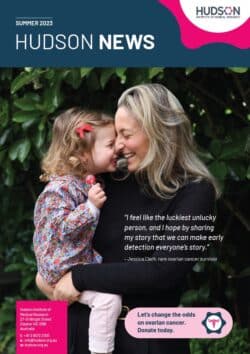Female infertility
Raising a family is an almost universal dream, but sadly infertility is more common that people think.
One in six Australian couples have difficulty conceiving. About one third infertility problems are with the woman, about one third are with the man and about one third are with both partners or the cause is unknown.
Not being able to conceive can be stressful and frustrating. The causes of female infertility are complex, and the related health conditions can have a major physical, emotional and financial impact on women and their families.
In addition to the personal emotional and financial toll, the costs of infertility treatment on the Australian healthcare system are substantial. In 2015, taxpayers contributed $254 million to infertility treatment.
What is infertility?

Infertility is when a couple cannot get pregnant after having unprotected sex (every two – three days) for a year.
After trying to get pregnant for one year, about 85 per cent of couples conceive. After two years, about 95 per cent of couples conceive.
Why is infertility so prevalent?
Many complex biological steps need to happen to achieve a successful pregnancy. A disruption to any step can cause infertility. The steps are
- Ovary releases a mature egg
- The egg moves into the fallopian tube
- Sperm swim up the cervix, through the uterus into the fallopian tube to reach the egg
- The egg is fertilised
- The fertilised egg travels back down the fallopian tube into the uterus
- The fertilised egg implants and grows in the uterus.
What causes infertility in women?

Causes of female infertility include not releasing an egg from either ovary due to
- Primary ovarian insufficiency, characterised by reduced ovarian function, and for which the cause is unknown in almost 90 per cent of cases
- Polycystic ovary syndrome (PCOS), a condition in which women produce excess male hormones, making it harder to get pregnant.
These conditions can lead to a range of chronic impacts on health, including endocrine dysfunction, increased susceptibility to bone disease such as osteoporosis, metabolic and cardiovascular disease, dementia, and detrimental impacts on psychosocial well-being. In addition, the number and quality of eggs naturally declines after a woman reaches 35 years of age due to the finite supply of eggs in the ovaries, known as the ovarian reserve. This is of increasing relevance as more women delay starting their family.
Other causes of female infertility can include
- Implantation – the fertilised egg may not implant in the lining of the uterus
- Blocked fallopian tubes – this can be a result of scar tissue from endometriosis, pelvic inflammatory disease or other surgery eg ectopic pregnancy
- Structural problems that prevent implantation eg fibroids
- Medical conditions eg autoimmune diseases can affect fertility
- Endometriosis
- Failure of an egg to mature properly.
In about a quarter of cases, it is not possible to identify the cause of infertility.
What are the risk factors for female infertility?
- Age – from mid-30s women produce fewer and poorer quality eggs, making conception more difficult
- Smoking – smoking damages some reproductive organs and increases the risk of ectopic pregnancy and miscarriage
- Illegal drug use
- Alcohol – excessive alcohol use
- Weight – being over or under weight affects ovulation
- Sexual history – sexually transmitted infections can damage fallopian tubes
- Stress – excessive physical or emotional stress
- Environmental – exposure to pesticides, solvents and metals.
How can women improve their fertility?

- Maintaining a healthy weight – being neither over nor under weight
- Having a healthy, balanced and nutritious diet
- Not smoking
- Avoiding alcohol
- Reducing stress
- Limiting caffeine
- Having sex every two to three days, particularly in the week before ovulation.
How is the cause of female infertility diagnosed?
Tests for infertility in women include blood tests to check hormones, a laparoscopy (a surgical procedure used to check reproductive organs), ultrasound scans, and physical examinations.
What are treatments for female infertility?
Infertility treatments depend on the cause and include surgical procedures, hormone therapy and assisted reproductive technologies (ART) including in vitro fertilisation (IVF).
- Women under 35 years should seek medical help after one year if they do not become pregnant.
- Women over the age of 35 years should seek help after six months of trying.
- Women who are aware of existing health conditions should see help earlier eg; endometriosis.
Our female infertility research
Discoveries made by our leading reproductive scientists have underpinned advancements in many women’s gynaecological conditions and reproductive treatments. Our researcher’s discoveries have greatly enhanced the understanding of reproductive health in women including
- Menstruation including how changes in the endometrium impact female reproductive health
- Maternal-embryo cross-talk which is critical for implantation
- How healthy egg follicles are formed, stored and released
- How hormones influence follicle production
- Endometriosis and its potential causes.
What factors influence ovarian function and female fertility?

 Molecular studies. Associate Professor Western and his team are determining how epigenetic factors regulate ovarian function, including egg growth and hormone production, and how exposure to chemicals, environmental agents or clinical treatments, such as anti-cancer drugs, might affect female fertility and female reproductive health.
Molecular studies. Associate Professor Western and his team are determining how epigenetic factors regulate ovarian function, including egg growth and hormone production, and how exposure to chemicals, environmental agents or clinical treatments, such as anti-cancer drugs, might affect female fertility and female reproductive health.
Lead Researcher | Associate Professor Patrick Western
Female infertility collaborators
Support for people with female infertility
For more information about infertility, please talk to your doctor. Hudson Institute scientists cannot provide medical advice.
Find out more about female infertility.
Keep up-to-date with our latest discoveries






 Molecular studies. Associate Professor Western and his team are determining how epigenetic factors regulate ovarian function, including egg growth and hormone production, and how exposure to chemicals, environmental agents or clinical treatments, such as anti-cancer drugs, might affect female fertility and female reproductive health.
Molecular studies. Associate Professor Western and his team are determining how epigenetic factors regulate ovarian function, including egg growth and hormone production, and how exposure to chemicals, environmental agents or clinical treatments, such as anti-cancer drugs, might affect female fertility and female reproductive health.



